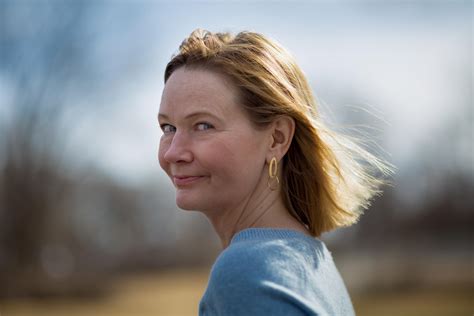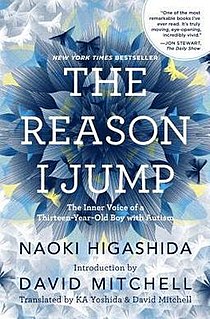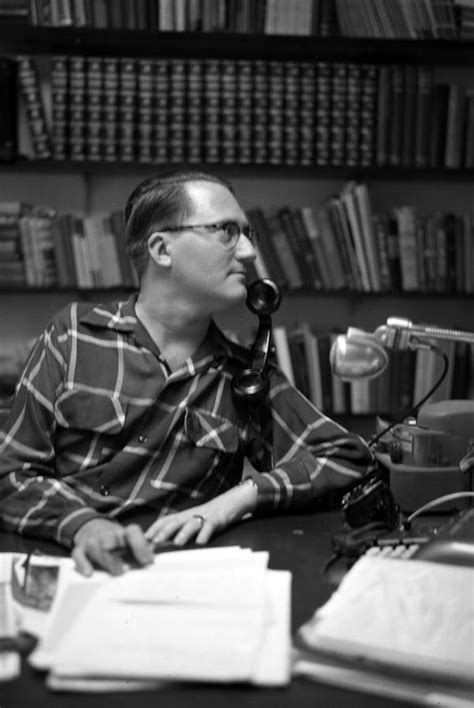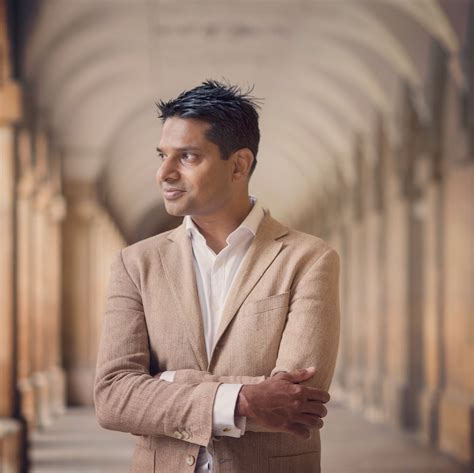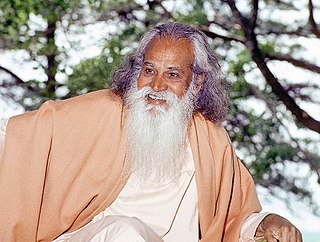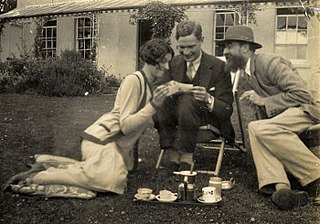Top 647 Unhappiness Quotes & Sayings - Page 11
Explore popular Unhappiness quotes.
Last updated on November 29, 2024.
By utility is meant that property is any object, whereby it tends to produce benefit, advantage, pleasure, good, or happiness(all this in the present case come to the same thing) or (what comes again to the same thing) to prevent the happening of mischief, pain, evil or unhappiness to the party who whose is considered: if that party be the community in general, then the happiness of the community; if a particular individual; then the happiness of that individual
The discipline of suffering, of great suffering- do you not know that only this discipline has created all enhancements of man so far? That tension of the soul in unhappiness which cultivates its strength, its shudders face to face with great ruin, its inventiveness and courage in enduring, preserving, interpreting, and exploiting suffering, and whatever has been granted to it of profundity, secret, mask, spirit, cunning, greatness- was it not granted to it through suffering, through the discipline of great suffering?
But I have never had the privilege of unhappiness in Happy Valley. California is about the good life. So a bad life there seems so much worse than a bad life anywhere else. Quality is an obsession there—good food, good wine, good movies, music, weather, cars. Those sound like the right things to shoot for, but the never-ending quality quest is a lot of pressure when you’re uncertain and disorganized and, not least, broker than broke. Some afternoons a person just wants to rent Die Hard, close the curtains, and have Cheerios for lunch.
I have nothing to make me miserable," she said, getting calmer; "but can you understand that everything has become hateful, loathsome, coarse to me, and I myself most of all? You can't imagine what loathsome thoughts I have about everything." "Why, whatever loathsome thoughts can you have?" asked Dolly, smiling. "The most utterly loathsome and coarse; I can't tell you. It's not unhappiness, or low spirits, but much worse. As though everything that was good in me was all hidden away, and nothing was left but the most loathsome.
There are two kinds of pity. One, the weak and sentimental kind, which is really no more than the heart's impatience to be rid as quickly as possible of the painful emotion aroused by the sight of another's unhappiness, that pity which is not compassion, but only an instinctive desire to fortify one's own soul agains the sufferings of another; and the other, the only one at counts, the unsentimental but creative kind, which knows what it is about and is determined to hold out, in patience and forbearance, to the very limit of its strength and even beyond.
My mother says that when Mrs. Rowley is mean, which is generally the case, it is really because she is just unhappy, and who could blame her with a husband like that . . . She says this is really the only reason people are ever mean--they have something hurting inside of them, a claw of unhappiness scratching at their hearts, and it hurts them so much that sometimes they have to push it right out of their mouths to scratch someone else, just to give themselves a rest, a moment of relief.
ZANY, n. A popular character in old Italian plays, who imitated with ludicrous incompetence the _buffone_, or clown, and was therefore the ape of an ape; for the clown himself imitated the serious characters of the play. The zany was progenitor to the specialist in humor, as we to-day have the unhappiness to know him. In the zany we see an example of creation; in the humorist, of transmission. Another excellent specimen of the modern zany is the curate, who apes the rector, who apes the bishop, who apes the archbishop, who apes the devil.
The great Sufi poet and philosopher Rumi once advised his students to write down the three things they most wanted in life. If any item on the list clashes with any other item, Rumi warned, you are destined for unhappiness. Better to live a life of single-pointed focus, he taught. But what about the benefits of living harmoniously among extremes? What if you could somehow create an expansive enough life that you could synchronize seemingly incongruous opposites into a worldview that excludes nothing?
The attitude of unhappiness is not only painful, it is mean and ugly. What can be more base and unworthy than the pining, puling, mumping mood, no matter by what outward ills it may have been engendered? What is more injurious to others? What less helpful as a way out of the difficulty? It but fastens and perpetuates the trouble which occasioned it, and increases the total evil of the situation. At all costs, then, we ought to reduce the sway of that mood; we ought to scout it in ourselves and others, and never show it tolerance.
Imagine a society that subjects people to conditions that make them terribly unhappy, then gives them the drugs to take away their unhappiness. Science fiction? It is already happening to some extent in our own society... Instead of removing the conditions that make people depressed, modern society gives them antidepressant drugs. In effect, antidepressants are a means of modifying an individual's internal state in such a way as to enable him to tolerate social conditions that he would otherwise find intolerable.
It is a basic human need that everyone wants to
live a happy life. For this, one has to experience
real happiness. The so-called happiness that one
experiences by having money, power, and
indulging in sensual pleasures is not real
happiness. It is very fragile, unstable and fleeting.
For real happiness, for lasting stable happiness,
one has to make a journey deep within oneself and
get rid of all the unhappiness stored in the deeper
levels of the mind. As long as there is misery at
the depth of the mind all attempts to feel happy
at the surface level of the mind prove futile.
Unlike some people who have experienced the loss of an animal, I did not believe, even for a moment, that I would never get another. I did know full well that there were just too many animals out there in need of homes for me to take what I have always regarded as the self-indulgent road of saying the heartbreak of the loss of an animal was too much ever to want to go through with it again. To me, such an admission brought up the far more powerful admission that all the wonderful times you had with your animal were not worth the unhappiness at the end.
As long as we're caught up in always looking for certainty and happiness, rather than honoring the taste and smell and quality of exactly what is happening, as long as we're always running from discomfort, we're going to be caught in a cycle of unhappiness and discomfort, and we will feel weaker and weaker. This way of seeing helps us develop inner strength. And what's especially encouraging is the view that inner strength is available to us at just the moment when we think that we've hit the bottom, when things are at their worst.
Oh God, God, please come to me, please illumine me, please act in me and through me. I don't know what's right and what's wrong. I can't tell anymore. I could be doing what I feel is right and perhaps I'm deceiving myself. Perhaps it's all my ego and my vanity. Please show me what's right or don't even show me. Please just do it, whether it brings me happiness or unhappiness, riches or poverty, sorrow or joy. Please act in and through me. I love only you.
But I ask you, those of you who are with us all day, not to stress yourselves out because of us. When you do this, it feels as if you're denying any value at all that our lives may have--and that saps the spirit we need to soldier on. The hardest ordeal for us is the idea that we are causing grief for other people. We can put up with our own hardships okay, but the thought that our lives are the source of other people's unhappiness, that's plain unbearable.
Happiness has nothing to do with what you have or don't have. Happiness is related to what you are. However many things you may collect, perhaps they may increase your worries, your troubles, but happiness will not increase because of them. Certainly unhappiness will increase with them, but they have no relation to an increase in your happiness.
If you don't enjoy getting up and working and finishing your work and sitting down to a meal with family or friends, then the chances are you're not going to be happy. If someone bases his happiness or unhappiness on major events like a great new job, huge amounts of money, a flawlessly happy marriage or a trip to Paris, that person isn't going to be happy much of the time. If, on the other hand, happiness depends on a good breakfast, flowers in the yard, a drink or a nap, then we are more likely to live with quite a bit of happiness.
Don't be too much concerned about money, because that is the greatest distraction against happiness. And the irony of ironies is that people think they will be happy when they have money. Money has nothing to do with happiness. If you are happy and you have money, you can use it for happiness. If you are unhappy and you have money, you will use that money for more unhappiness. Because money is simply a neutral force.
By tuning in to your minute-to-minute stream of consciousness, you discover the addictions that make you worried, anxious, resentful, uptight, afraid, angry, bored, etc. You thus use every uncomfortable emotion as an opportunity for consciousness growth. Even though you may still be feeling emotional and uptight, you begin to get at the roots of your ups and downs - your brief bits of pleasure and your long periods of unhappiness.
The belief that unhappiness is selfless and happiness is selfish is misguided. It's more selfless to act happy. It takes energy, generosity, and discipline to be unfailingly lighthearted, yet everyone takes the happy person for granted. No one is careful of his feelings or tries to keep his spirits high. He seems self-sufficient; he becomes a cushion for others. And because happiness seems unforced, that person usually gets no credit.
It is entirely wrong to think that we have done, or can do, good to the world, or to think that we have helped such and such people. It is a foolish thought, and all foolish thoughts bring misery. We think that we have helped some man and expect him to thank us, and because he does not, unhappiness comes to us. Why should we expect anything in return for what we do? Be grateful to the man you help, think of him as God. Is it not a great privilege to be allowed to worship God by helping our fellow men?
The way you feel is your point of attraction, and so, the Law of Attraction is most understood when you see yourself as a magnet getting more and more of the way you feel. When you feel lonely, you attract more loneliness. When you feel poor, you attract more poverty. When you feel sick, you attract more sickness. When you feel unhappy, you attract more unhappiness. When you feel healthy and vital and alive and prosperous-you attract more of all of those things.
This Creative Mechanism within you is impersonal. It will work automatically and impersonally to achieve goals of success and happiness, or unhappiness and failure, depending upon the goals which you yourself set for it. Present it with success goals and it functions as a Success Mechanism. Present it with negative goals, and it operates just as impersonally, and just as faithfully as a Failure Mechanism.
We find the vast majority of people in every country believing that there will be a time when this world will become perfect, when there will be no disease, nor death, nor unhappiness, nor wickedness. That is a very good idea, a very good motive power to inspire and uplift the ignorant. But if we think for a moment, we shall find on the very face of it that it cannot be so. How can it be, seeing that good and evil are the obverse and reverse of the same coin? How can you have good without evil at the same time?
These are illusions of popular history which successful religion must promote: Evil men never prosper; only the brave deserve the fair; honesty is the best policy; actions speak louder than words; virtue always triumpths; a good deed is its own rewards; any bad human can be reformed; religious talismans protect one from demon possession; only females understand the ancient mysteries; the rich are doomed to unhappiness
We all create expectations of what we would like to happen after a decision is made. The picture in our mind's eye might have served a valuable function in helping to make a decision. But once the decision is made, let the picture go. Since you can't control the future, the picture can create unhappiness if it's not fulfilled. Disappointment may make you miss the good that can come out of every situation in which you find yourself.
According to the Buddha, the failure to recognize the illusion of the self is the source of all ignorance and unhappiness. It is only by renouncing the self, that is, by dropping his ego defences and committing metaphorical suicide, that a person can open up to different modes of being and relating and thereby transform himself into a pure essence of humanity. In so doing, he becomes free to recast himself as a much more joyful and productive person, and attains the only species of transcendence and immortality that is open to man.
All the fear in the world, and the violence that comes from the fear, and the hatred that comes from the violence, and the lonliness that comes from the hatred. All the unhappiness, all the cruelty, it gathers like clouds in the air, and grows dark and cold and heavy, and falls like grey snow in thick layers over the land. Then the world is muffled and numb, and no one can hear each other or feel each other. Think how sad and lonely that must be.
In this life we have to make many choices. Some are very important choices. Some are not. Many of our choices are between good and evil. The choices we make, however, determine to a large extent our happiness or our unhappiness, because we have to live with the consequences of our choices. Making perfect choices all of the time is not possible. It just doesn't happen. But it is possible to make good choices we can live with and grow from.
All blame is a waste of time. No matter how much fault you find with another, and regardless of how much you blame him, it will not change you. The only thing blame does is to keep the focus off you when you are looking for external reasons to explain your unhappiness or frustration. You may succeed in making another feel guilty about something by blaming him, but you won't succeed in changing whatever it is about you that is making you unhappy.
This relaxation is the space in which happiness grows, and again I repeat: for no reason at all. It is not that you are happy because of something. You are simply happy. Happiness is your nature. Unhappiness is something nurtured, you have learned it. Every credit goes to you for all your misery, but for happiness, you cannot have any credit. It is natural. You were born happy. You were happy in your mother's womb.
Why do we protect children from life? It's no wonder that we become afraid to live. We're not told what life really is. We're not told that life is joy and wonder and magic and even rapture, if you can get involved enough. We're not told that life is also pain, misery, despair, unhappiness, and tears. I don't know about you, but I don't want to miss any of it. I want to embrace life, and I want to find out what it's all about. I wouldn't want to go through life without knowing what it is to cry.
This is what meditation is all about, just becoming a watcher. Failure comes, success comes, you are praised, you are condemned, you are respected, you are insulted - all kinds of things come, they are all dualities. And you go on watching. Watching the duality, a third force arises in you; a third dimension arises in you. The duality means two dimensions: one dimension is happiness; another is unhappiness. Watching both, a depth arises in you: the third dimension, witnessing, sakshin.
To me, life in its totality is good. And when you understand life in its totality, only then can you celebrate; otherwise not. Celebration means: whatsoever happens is irrelevant - I celebrate. Celebration is not conditional on certain things: 'When I am happy then I will celebrate,' or, 'When I am unhappy I will not celebrate.' No. Celebration is unconditional; I celebrate life. It brings unhappiness - good, I celebrate it. It brings happiness - good, I celebrate it. Celebration is my attitude, unconditional to what life brings.
It is a curious truth - and yet a truth forced upon us by daily observation - that it is not the women who have suffered most who are the unhappy women. A state of permanent unhappiness - not the morbid, half-cherished melancholy of youth, which generally wears off with wiser years, but that settled, incurable discontent and dissatisfaction with all things and all people, which we see in some women, is, with very rare exceptions, at once the index and the exponent of a thoroughly selfish character.
It would be more in keeping with the intention of the noblest man in this world if our two Christian churches, instead of annoying Negroes with missions which they neither desire nor understand, would kindly, but in all seriousness, teach our European humanity that where parents are not healthy it is a deed pleasing to God to take pity on a poor little healthy orphan child and give him father and mother, than themselves to give birth to a sick child who will only bring unhappiness and suffering on himself and the rest of the world.
Because they claim to be concerned with the welfare of whole societies, governments arrogate to themselves the right to pass off as mere abstract profit or loss the human unhappiness that their decisions provoke or their negligence permits. It is a duty of an international citizenship to always bring the testimony of people's suffering to the eyes and ears of governments, sufferings for which it's untrue that they are not responsible. The suffering of men must never be a mere silent residue of policy. It grounds an absolute right to stand up and speak to those who hold power.
Whether happiness or unhappiness, freedom or slavery, in short whether good or evil results from an improved environment depends largely upon how the change has been brought about, upon the methods by which the physical results have been reached, and in what spirit and for what purpose the fruits of that change are used. Because a higher standard of living, a greater productiveness and a command over nature are not good in and of themselves does not mean that we cannot make good of them, that they cannot be a source of inner strength.
What is it that dies? A log of wood dies to become a few planks. The planks die to become a chair. The chair dies to become a piece of firewood, and the firewood dies to become ash. You give different names to the different shapes the wood takes, but the basic substance is there always. If we could always remember this, we would never worry about the loss of anything. We never lose anything; we never gain anything. By such discrimination we put an end to unhappiness. (118-119)
I think, from a progressive point of view, to have a Democratic Congress and a Democratic White House, and to have spent the time on Obamacare, which had real benefits, 20 million insured, but not on inequality, was a major cost to the Democratic Party, costing them their majorities, but also a bit of a cost to the country, because it didn't address the fundamental issues that led to Donald Trump and that led to a lot of unhappiness, just the continued widening inequality.
No one can practice the precepts perfectly, including the Buddha... Boiled vegetables contain dead bacteria. We cannot practice the First Precept or any of the precepts perfectly. But because of the real danger in our society-alcoholism has destroyed so many families and has brought about much unhappiness-we have to do something. We have to live in a way that will eradicate that kind of damage. That is why even if you can be very healthy with one glass of wine every week, I still urge you with all my strength to abandon that glass of wine.
I really wanted to get out of that cycle in our family where somebody's taking revenge on somebody for some slight that happened thirty years ago, and the only way to assert one's existence is by climbing over the body of an unfortunate sibling, or with a fellow family member, and you end up even unconsciously rejoicing in the other person's unhappiness and being like, I am happy because I can see how unhappy these other people are.
Maybe you think you’ll be entitled to more happiness later by forgoing all of it now, but it doesn’t work that way. Happiness takes as much practice as unhappiness does. It’s by living that you live more. By waiting you wait more. Every waiting day makes your life a little less. Every lonely day makes you a little smaller. Every day you put off your life makes you less capable of living it.
Our possibilities of happiness are already restricted by our constitution. Unhappiness is much less difficult to experience. We are threatened with suffering from three directions: from our own body, which is doomed to decay and dissolution and which cannot even do without pain and anxiety as warning signals; from the external world, which may rage against us with overwhelming and merciless forces of destruction; and finally from our relations to other men. The suffering which comes from this last source is perhaps more painful to us than any other.
The future seems a little gloomy! Go to bed early, sleep well, eat moderately at breakfast; the future looks brighter. The world's outlook may not have changed, but our capacity for dealing with it has. Happiness, or unhappiness, depends to some extent on external conditions, but also, and in most cases chiefly, on our own physical and mental powers. Some people would be discontented in Paradise, others ... are cheerful in a graveyard.
I have decided to keep a record of my inmost real-self thoughts. Perhaps it will help me to find out what I really am like: horrid, I know: selfish, conceited, and material-minded. For instance, lately whenever I've tried to concentrate on anything serious or beautiful, I've started thinking about the Spencers' dance next week. I am ashamed of my pettiness. I'm going to try to do better this year--develop my character more and not always be thinking about enjoying myself. I've always been so happy, I dread disappointment and unhappiness, but they would be good for me. But I don't want them.





